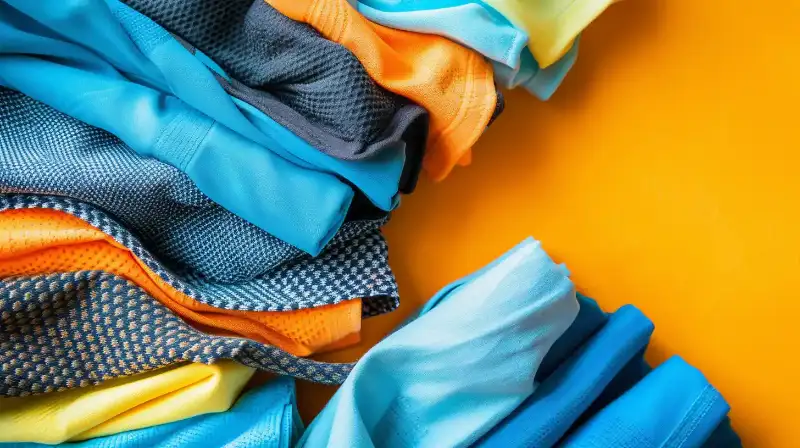Selecting the right wholesale fabric partner is essential for success in the activewear industry. The American market for athletic apparel, swimwear, and dancewear requires high-quality materials. Choosing the right wholesale supplier can greatly influence your competitiveness. In this guide, we will explore the key criteria to consider when selecting a wholesale fabric supplier in the USA.
Experience and Specialization
The first factor to consider is the supplier’s track record in the market. Suppliers with decades of experience possess extensive industry knowledge and have established connections with manufacturers. Those in operation for over 40 years are particularly valuable, as they have typically navigated various economic challenges, ensuring a stable supply even during difficult times.
Additionally, a supplier that specializes in stretch fabrics for activewear demonstrates an understanding of the unique technical requirements for these materials. This expertise ensures the selection of fabrics with the necessary stretch, strength, and durability for athletic apparel, swimwear, and dancewear.
Product Range and Inventory
Having a wide range of materials is essential for producing different types of products. A good wholesale supplier should offer a range of fabric options, including soft, stretchy materials like tricot and interlock, as well as luxurious options like stretch velvet. They should also offer linings, breathable mesh, and jersey fabrics, giving you plenty of choices for your needs. It’s essential to have a variety of compositions available, including nylon, polyester, their recycled versions, spandex, and cotton.
Having substantial inventory is critical for fast order fulfillment. This minimizes production delays, which is especially important for seasonal collections and rush orders. The ability to receive materials within 2-7 days across the USA provides a significant competitive advantage, allowing you to respond quickly to changing market demands.
Customization Capabilities
The current activewear market demands unique designs. Therefore, your supplier must offer not only ready-made solutions but also the chance to create exclusive materials. An extensive library of prints—ideally containing at least 20,000 designs—enables you to find suitable options for your products quickly.
Having the ability to create custom prints with your unique designs provides creative freedom and helps you stand out in the marketplace. Additionally, custom fabric production services are essential, with over 1,000 different options available, allowing you to explore numerous possibilities for creating distinctive products, which is particularly important for brands seeking innovation.
Environmental Responsibility
In today’s world, sustainability isn’t just a trend—it’s a necessity. Consumers are increasingly paying attention to the origins of materials and their environmental impact. When choosing a supplier, make sure they work with certified eco-friendly fabrics and hold international environmental safety certifications.
Recycled materials are becoming an industry standard, and having these options in a supplier’s range indicates their modern approach to business. Quality control at the warehouse ensures that you receive materials that meet the stated environmental standards, which is crucial for maintaining your brand’s reputation.
Technical Fabric Characteristics
For activewear production, the technical properties of fabrics play a crucial role. Ensure the supplier can offer materials with the necessary characteristics: 4-way stretch for comfort and freedom of movement, breathability for body temperature regulation, and chlorine resistance for swimwear.
Additional features, such as moisture-wicking, quick-drying, and chlorine resistance, enhance the consumer value of your products. The supplier should provide comprehensive information about the technical characteristics of each fabric type and assist you in selecting the optimal materials for specific garment types.
Logistics and Delivery Coverage
Efficient logistics are fundamental to maintaining uninterrupted production. An ideal supplier should have a warehouse located in the U.S. with top-selling fabrics, ensuring fast delivery and reducing the risk of delays. Moreover, the ability to manage both nationwide U.S. deliveries and international shipments enhances the partnership’s flexibility.
It is also essential for businesses of all sizes to have the option to order small samples for testing, as well as full rolls for mass production. This capability enables new brands to begin with small batches and scale their operations as they expand, all while maintaining a consistent working relationship with the same supplier.
Service Level and Expert Support
Quality customer service can be the deciding factor in a long-term partnership. Look for suppliers who offer comprehensive business support. Company specialists should analyze your needs and suggest optimal solutions, taking into account your production specifics and target audience.
Consultations on fabric selection, trend analysis assistance, and creative recommendations enhance the partnership’s value. For new brands, such support is critical—an experienced supplier can become a mentor, helping you avoid common mistakes and optimize production processes.
Manufacturer Partnerships
A reliable supplier should have direct connections with leading textile mills worldwide. Partnerships with over 20 major manufacturers indicate operational scale and the ability to ensure stable supplies of quality materials. Such a network of partners guarantees access to innovative technologies and the latest materials.
Quality control should be implemented at all stages—from production to warehouse storage. Inspection of both stock items and made-to-order materials minimizes the risk of receiving defective products and protects your brand’s reputation.
Conclusion
Choosing a wholesale fabric supplier is a strategic decision requiring careful analysis. Focus on companies with solid experience, a broad product range, customization capabilities, and a commitment to environmental responsibility. Pay attention to fabric technical characteristics, logistics efficiency, and service support level. The right partner will help your business grow by providing quality materials and expert knowledge necessary for success in the competitive activewear industry.

